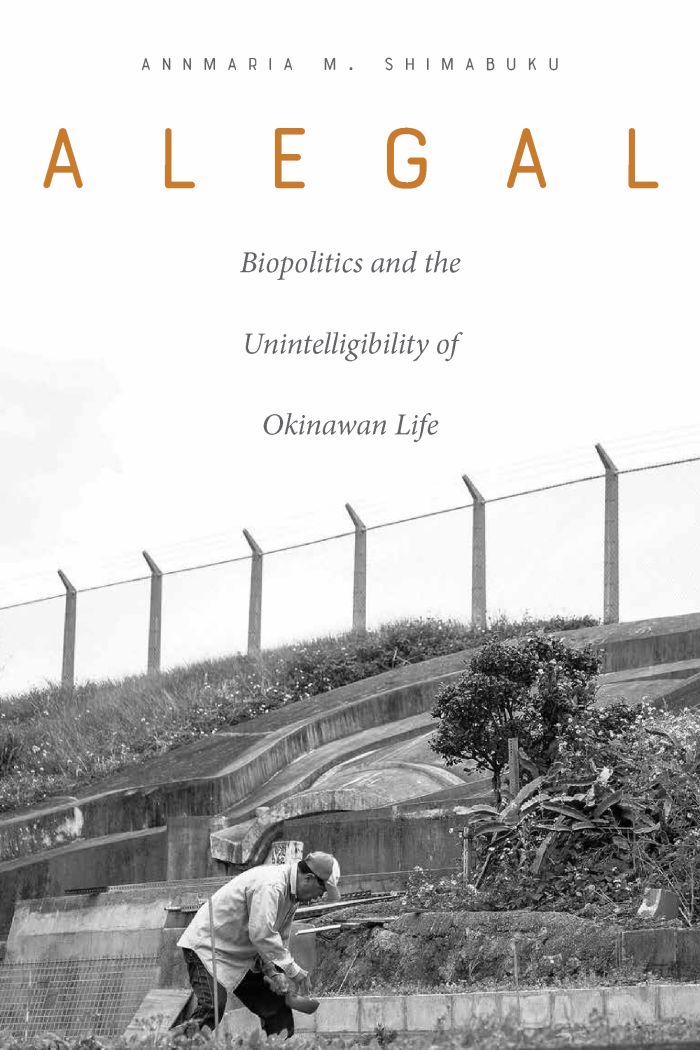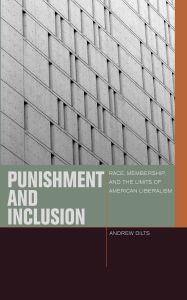Alegal
Biopolitics and the Unintelligibility of Okinawan Life

This book can be opened with

Okinawan life, at the crossroads of American militarism and Japanese capitalism, embodies a fundamental contradiction to the myth of the monoethnic state. Suspended in a state of exception, Okinawans have never been officially classified as colonial subjects of the Japanese empire or the United States, nor have they ever been treated as equal citizens of Japan. As a result, they live amid one of the densest concentrations of U.S. military bases in the world. By bringing Foucauldian biopolitics into conversation with Japanese Marxian theorizations of capitalism, Alegal uncovers Japan’s determination to protect its middle class from the racialized sexual contact around its mainland bases by displacing them onto Okinawa, while simultaneously upholding Okinawa as a symbol of the infringement of Japanese sovereignty figured in terms of a patriarchal monoethnic state.
This symbolism, however, has provoked ambivalence within Okinawa. In base towns that facilitated encounters between G.I.s and Okinawan women, the racial politics of the United States collided with the postcolonial politics of the Asia Pacific. Through close readings of poetry, reportage, film, and memoir on base-town life since 1945, Shimabuku traces a continuing failure to “become Japanese.” What she discerns instead is a complex politics surrounding sex work, tipping with volatility along the razor’s edge between insurgency and collaboration. At stake in sovereign power’s attempt to secure Okinawa as a military fortress was the need to contain alegality itself—that is, a life force irreducible to the legal order. If biopolitics is the state’s attempt to monopolize life, then Alegal is a story about how borderland actors reclaimed the power of life for themselves.
In addition to scholars of Japan and Okinawa, this book is essential reading for anyone interested in postcolonialism, militarism, mixed-race studies, gender and sexuality, or the production of sovereignty in the modern world.
Alegal is available from the publisher on an open-access basis.
"Utilizing multiple and varied sources, the treatise spotlights numerous issues of interest to scholars specializing in borderland or postcolonial studies."—Choice
[This] book will continue to inform and inspire scholars of Okinawan studies and beyond, myself included, for further engagement in and elaboration of the realm of alegality that Shimabuku has brilliantly opened up.—Masamichi Inoue, Journal of Japanese Studies
“Alegal is an exploration of how the law—and sovereign authority more generally—always exist in relation to an unrecognized and subordinated relationship to an indeterminate other. Shimabuku examines the complex relationship between the United States and Japan as it played out through the racialized and gendered bodies of Okinawa, producing authorities and histories that both occlude and create. While Okinawa may seem at the periphery of two imperial powers, Shimabuku puts it dead center in a brilliant and sharp-eyed account of how zones of alegality are also zones of origin for the law itself.”—James Martel, San Francisco State University
“Through an analytic of ‘mixed race,’ Shimabuku offers an incisive indictment of Japan’s middle-class ideology of heteronormativity and racial purity. Provocatively illuminating the recalcitrant possibilities of Okinawan politics and lifeforms beyond law and the State, Alegal must be engaged by everyone concerned with post-1945 Okinawa and fascism in our time.”—Lisa Yoneyama, University of Toronto
Preface ix
Note on Translations and Romanizations xvii
List of Commonly Used Acronyms and Abbreviations xix
Introduction 1
1. Japan in the 1950s: Symbolic Victims 15
2. Okinawa, 1945–1952: Allegories of Becoming 38
3. Okinawa, 1952–1958: Solidarity under the Cover of Darkness 65
4. Okinawa, 1958–1972: The Subaltern Speaks 88
5. Okinawa, 1972–1995: Life That Matters 124
Conclusion 143
Acknowledgments 147
Notes 149
Selected Bibliography 195
Index 211
Please click the link below to download the Open Access version of this book.
- Alegal - epub




